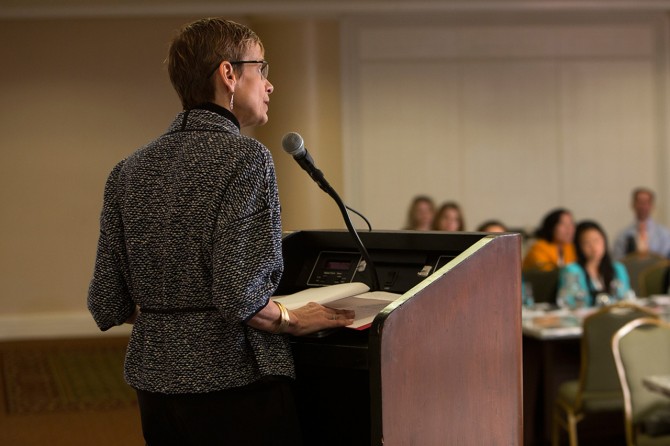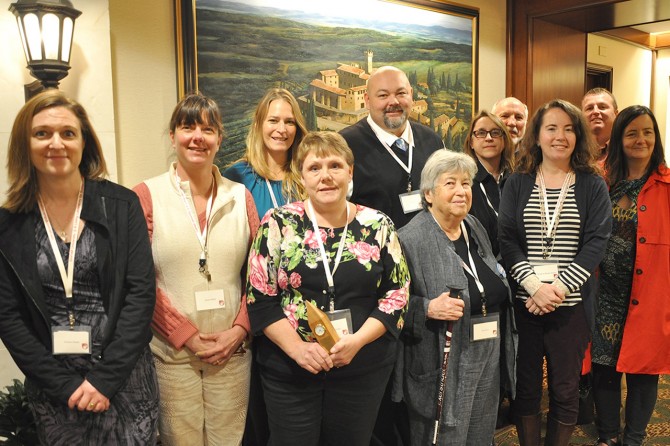Move toward greater sustainability a priority, says Garrett
By Blaine Friedlander
In her remarks at the President’s Sustainable Campus Committee fall summit Nov. 12, President Elizabeth Garrett underscored the university’s commitment to addressing climate change by announcing formation of the Senior Leaders Climate Action Group.
The group – chaired by KyuJung Whang, vice president for infrastructure, planning and properties; and Lance Collins, the Joseph Silbert Dean of Engineering – will be composed of deans, vice presidents and other campus leaders to focus on improving current climate trends by advancing public policy on climate change and spurring innovative, cross-disciplinary solutions.
“Meeting the energy, environmental, economic and social needs of the present – without compromising the ability of future generations to do the same – is one of the critical challenges of our time, not only for New York and the country, but for the world,” Garrett said.
The president and campus leaders “agree that moving toward greater sustainability is a priority,” explained Garrett, “and we must focus upon the disciplines in which we excel and use our own campus and region as a living laboratory.”
Early in her keynote, Garrett spoke of Cornell’s sustainability priorities – sometimes referred to as a “triple bottom line” that focuses on people, the planet and prosperity. The president added a fourth priority – purpose – that stands for Cornell’s academic mission. It’s a “quadruple bottom line,” she said, which will help the university accentuate its sustainability efforts in research, creative work and teaching.
Garrett said sustainability and energy are areas of long-standing academic strength at Cornell, and these areas offer opportunities for increased effort and impact. “We will continue to be leaders in these fields for this country and the world,” she said.
Cornell should use its strength in education to reduce global warming and climate change, she said: “We should be focused on having global impact in addressing this problem through our teaching and our research in a way that changes the world.”
Garrett mentioned an increase in the types of sustainability classes and programs the university will offer. “We will be highlighting our outstanding educational programs in this arena as we go around the world seeking the best students for Cornell,” she said. “This focus appeals to some of the very best students in the country who need to understand that if they can come to Cornell they can make a difference they cannot make anywhere else.”
In addition to Garrett’s keynote address, the summit featured a talk by Maria Jiang ’16 on the importance of environmental economics and a discussion by doctoral student Miles Schwartz Sax on Cornell’s Urban Horticulture Institute. Valerie Shao ’16, Namita Joshua ’16, Yining Dai ’15 and Yinuo Zhang ’16 discussed the feasibility of transporting and turning biomass on campus into bioenergy for Ithaca.
A panel discussion on the “Think BIG, Live Green” sustainability engagement campaign concluded the day. Erin Moore, sustainability engagement manager, served as moderator for panelists Whang; Dawn McWilliams, director of marketing and communications for the College of Engineering; Jim Hatch, facilities manager, College of Human Ecology; Christie Abel ’17; and Glenn Evans, director of agricultural operations at the College of Agriculture and Life Sciences.
The PSCC awarded its annual CU Partners in Sustainability Awards to the Friendship Donations Network, for helping to redistribute fresh food that would otherwise be thrown away from stores, farms and Cornell dining to community food bank programs; Kristin Aldred Cheek ’16, for the Divert It card game; Samsuda Khem-nguad ’16 and Emily Dong ’16, members of the WasteNot team; Ross Hansen, Shoals Marine Laboratory; and James Hatch, College of Human Ecology Green Ambassadors program.
Media Contact
Get Cornell news delivered right to your inbox.
Subscribe
